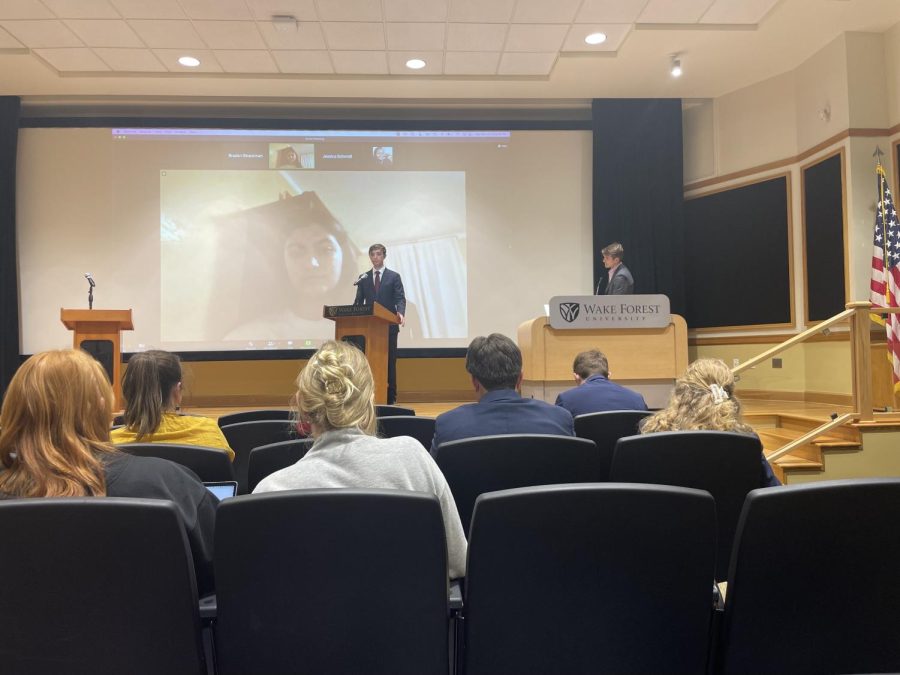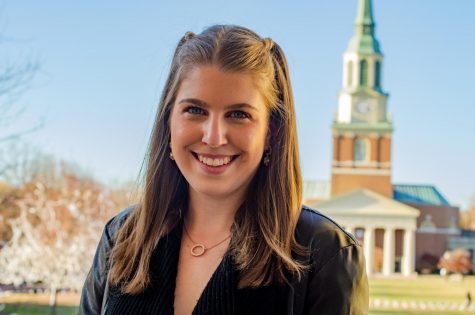Student Government executive candidates debate
Candidates make their final pitch to voters
Ethan Wearner and Pilar Agudelo debate in the president’s race.
March 22, 2022
Candidates for Student Government Executive positions debated in Pugh Auditorium Sunday night in anticipation for the student body-wide election, which will take place between noon on Tuesday and 11:59 a.m. on Wednesday.
President Ally Swartzberg opened by introducing the order of debates: Secretary, Treasurer, Speaker of the House and President, respectively. She outlined the structure of each debate, in which candidates began with an opening statement, answered a series of questions and either ended with a closing statement or posed a question directed toward their opponent. Swartzberg noted the opportunity for members in the audience to ask questions in person or through Instagram at the end of each position’s debate.
Sophomore Melissa Carver and junior Jessica Schmidt debated for secretary, sophomore Tim Erday ran unopposed for treasurer, sophomore Jackson Buttler ran unopposed for speaker of the house and junior Pilar Agudelo and junior Ethan Wearner debated for president.
Agudelo and Schmidt debated over Zoom while abroad.
Elections committee member Rory Britt moderated the debate, posing multiple questions to candidates, allowing them to further discuss their platform. Britt also opened the floor to questions, while current Treasurer Brooke Blair moderated questions asked over Instagram.
One question asked over Instagram inquired about how Carver and Schmidt plan to reach students that fall outside of their typical social circles. Both candidates discussed the tendency for Wake Forest students to revert to their typical social ties and friend groups, discussing their intentions to improve this environment on campus.
“Intentionality is what it comes down to,” Schmidt said. “It’s about really wanting to make connections that aren’t inside your circle. It’s about branching out, it’s about setting up opportunities that allow you to be in front of people . . . really branching and bridging between groups on campus and that is something I’m really passionate about.”
Carver discussed her efforts to diversify her friend group, particularly exemplified through her housing situation, in which all of her suitemates are involved in different areas on campus.
“It’s really hard to be stuck in your ways sometimes and making those connections and making sure they last and putting the effort in and making sure that everything is effortful and put intention into every single relationship and making sure you diversify your perspective and just continue that through the four years that you’re here,” Carver said.
Following the debate for Secretary, Erday and Buttler further discussed their platforms for the roles of Treasurer and Speaker of the House, respectively, and responded to questions solely posed by Britt, as both candidates ran unopposed.
Nearing the end of the debate, Wearner took the podium and Agudelo took the Zoom screen.
Audience hands flew up at the conclusion of the presidential debate, eager to direct questions toward the candidates.
Both candidates used this opportunity to defend their platforms and qualifications for the presidency.
One question, posed by Carver, inquired about a liaison or constituent outreach program Wearner discussed, which intends to enlist people in student government to reach the student body regarding their concerns.
“How do you intend to be more personable?” Carver asked. “I feel like when I think of a President and my constituents think of a President they think of someone who is personable and has that transparency with them. How are you going to make your presidency, if elected, personable instead of just sending out people into the community to communicate to you what other people want?”
Wearner responded by refining the idea behind his potential program and defending his active role in reaching students.
“Thank you for that question, Melissa and just to clarify, I’m not sending out senators to the field to be my lackeys, I am going to be out there looking for constituent concerns as well,” Wearner said. “I’ve done that quite a bit throughout this campaign. I met with over 500 students, I’ve talked with them and heard their concerns. I’ve spoken with them face-face. As president, I’ll be out there looking for student concerns, making sure my voice is heard in the community.”
Both candidates responded to a question asked by junior Conor Metzger regarding an ongoing student concern, the University Counseling Center (UCC). Metzger inquired about how the candidates plan to improve the UCC.
Wearner discussed his desire to make sure the ratio of counselors to students aligns with the International Accreditation of Counseling Services, which, by his best estimate, is one counselor to 879 students. Wearner seeks to reduce this ratio to one counselor for every 650 students. He also advocates for more group therapy and for the ability of students to find mentors.
Agudelo believes the concerns surrounding the UCC stem from the poor working environment at Wake Forest and voiced her intent to better the workplace, and, through this method, increase help for students.
“The environment at Wake Forest is a difficult environment to work in and when you’re constantly burdening counselors, they choose not to stay at Wake Forest and be an employee here, so I think one of the biggest issues is addressing how we can make this a better workplace environment and therefore better at directly serving our students,” Agudelo said. “One of the biggest priorities is talking to [Counseling Center Director] Dr. [Warrenetta] Mann and other people at Wake Forest in high level staffing positions about how we can encourage a better environment for them to work in and want to help students.”
Many candidates emphasized that polls for voting will be open on Tuesday and will close on Wednesday. More information about the candidates’ platforms can be found here.















